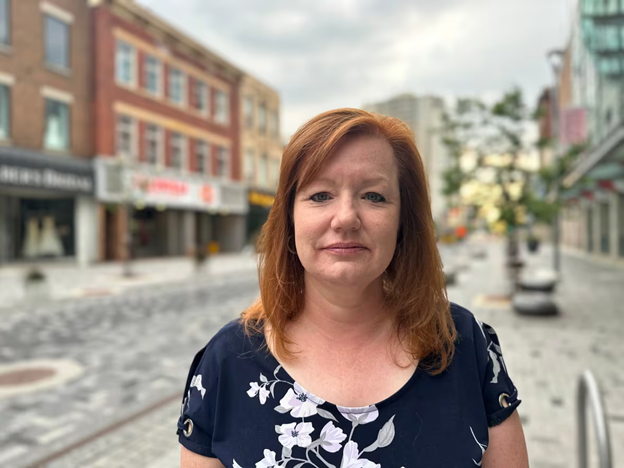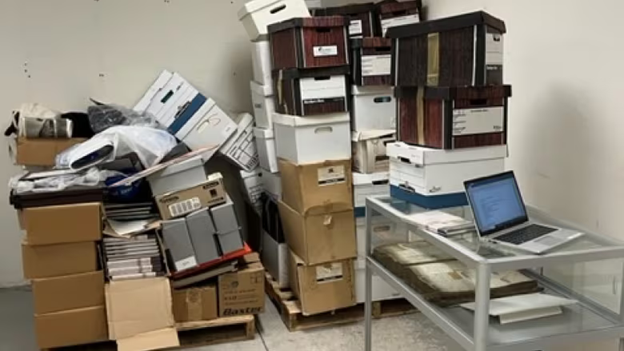What's stopping them? London Health Sciences Centre officials won't let anyone look at the documents, said Michelle Hamilton, a historian and professor at Western University, who has was brought in to work with the Vision SoHo Alliance in 2021 to document the culture and history of the South of Horton neighbourhood and its now-demolished South Street Hospital.
"We've been trying in various ways for three years to access these records and nothing," Hamilton told CBC News. "There is a committee that is deciding the fate of these records, but it should have a historian on it. How can you decide what's historical if you're not a historian?"
The material dates back to the late 1800s, according to an archivist who has seen some of it. It was held at the South Street Hospital Museum and Archives until the 1990s, when the museum closed. After that, it was moved to the South Street hospital, which also eventually closed, she said.
Archivists and historians are worried about the condition in which the documents were previously stored, how it is being stored now, and what will be done with it in the future.
Hospital will determine 'suitable pathway'
"These approximately 100 boxes include material from the Beck Tuberculosis Sanitarium, University Hospital and Westminister Hospital, the veterans' hospital pre-Parkwood. Frederick Banting did war research there in the Second World War. It is more than just London history," Hamilton said.
CBC News reached out to the London Health Sciences Centre last Thursday, asking for an interview about the documents in the next two days. A hospital spokesperson said no one would be available for an interview, but that officials are committed to caring properly for the documents and other materials.
"An internal committee, including our patient partners, will decide how we move forward with remaining materials. This could include a process to hire archivists or other professionals to sort through material and determine handling and archival value," a hospital spokesperson said in an email.
"Once this assessment phase is complete, the committee will engage with appropriate organizations to determine a suitable pathway for any items that require preservation through proper archival."

South Street Hospital Museum archives in a basement room. (Supplied by Michelle Hamilton)
But the hospital needs to be more transparent with the archives, Hamilton said.
Hamilton, along with others behind the Vision SoHo project and those concerned about the archives, have spoken to people in the hospital's communications department, the president and her secretary, the hospital's librarian, the board of directors, and some vice presidents, she said. They were told that some of the bodes were marked to be destroyed.
It's clear from photos of the material that some there is a "carelessness" to how things are being stored, Hamilton said. Old pictures ought to be handled with gloves, and an old ledger that can be seen in one of the photos shouldn't be exposed to light, she added.
"The fact that it's open like that and probably has been for years just demonstrates that they don't know how to take care of it," Hamilton said. "It should not be open, it should be in a proper container. It should not even be in light."
When the documents belonged to the South Street Hospital Museum and Archive, they were overseen by an archivist who knew how to store and care for the material and how to file it properly so the record can be kept in tact, Hamilton said.
Hamilton and others are baffled about why the hospital has not chosen to work with those who are preserving South Street history as the area is turned into an ambitious housing development that also incorporates plaques and other material from the hospital that served the city for decades.
In fact, they've been told by archivists at the University of Toronto and Wilfred Laurier University that the hospital approached those institutions about taking the archives. Archivists there said Western University and those working on the SoHo project would be best suited to look at the documents, Hamilton said.

"Having it deposited in different archives would be much better than what is happening now, but it makes the most sense to keep them in London," she said. "It doesn't make sense to divide it up, but if ultimately they went somewhere else at least they would be saved. It wouldn't be logical, but at least it would be safe."
The records are unlikely to have patient information on it that is protected by privacy laws, because of the age of the documents, she added. Her work with the SoHo Alliance has shown her how much of a connection Londoners have with the South Street hospital, and she'd like to see the plaques, pictures, documents and other material saved, Hamilton said.
"Londoners have told us so many stories. Sometimes regular Londoners just want to say to us, 'I was born there,' or other people have wonderful stories about their careers spent there, or medical or nursing school," she said.
"People met there, got married, had kids, and they have so many connections. There are more of those stories in those boxes and I want to hear more about them."
A petition to save the archives has been signed by the curator of Banting House and Elgin County Museum, the president of the Architectural Conservatory of Ontario, multiple historians, archivists, and those behind the Vision SoHo Alliance development project.


